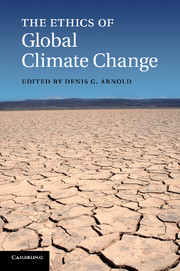Book contents
- Frontmatter
- Contents
- List of illustrations
- List of contributors
- Acknowledgements
- Introduction: climate change and ethics
- 1 Energy, ethics, and the transformation of nature
- 2 Is no one responsible for global environmental tragedy? Climate change as a challenge to our ethical concepts
- 3 Greenhouse gas emission and the domination of posterity
- 4 Climate change, energy rights, and equality
- 5 Common atmospheric ownership and equal emissions entitlements
- 6 A Lockean defense of grandfathering emission rights
- 7 Parenting the planet
- 8 Living ethically in a greenhouse
- 9 Beyond business as usual: alternative wedges to avoid catastrophic climate change and create sustainable societies
- 10 Addressing competitiveness in US climate policy
- 11 Reconciling justice and efficiency: integrating environmental justice into domestic cap-and-trade programs for controlling greenhouse gases
- 12 Ethical dimensions of adapting to climate change-imposed risks
- 13 Does nature matter? The place of the nonhuman in the ethics of climate change
- 14 Human rights, climate change, and the trillionth ton
- Select bibliography
- Index
- References
14 - Human rights, climate change, and the trillionth ton
Published online by Cambridge University Press: 11 April 2011
- Frontmatter
- Contents
- List of illustrations
- List of contributors
- Acknowledgements
- Introduction: climate change and ethics
- 1 Energy, ethics, and the transformation of nature
- 2 Is no one responsible for global environmental tragedy? Climate change as a challenge to our ethical concepts
- 3 Greenhouse gas emission and the domination of posterity
- 4 Climate change, energy rights, and equality
- 5 Common atmospheric ownership and equal emissions entitlements
- 6 A Lockean defense of grandfathering emission rights
- 7 Parenting the planet
- 8 Living ethically in a greenhouse
- 9 Beyond business as usual: alternative wedges to avoid catastrophic climate change and create sustainable societies
- 10 Addressing competitiveness in US climate policy
- 11 Reconciling justice and efficiency: integrating environmental justice into domestic cap-and-trade programs for controlling greenhouse gases
- 12 Ethical dimensions of adapting to climate change-imposed risks
- 13 Does nature matter? The place of the nonhuman in the ethics of climate change
- 14 Human rights, climate change, and the trillionth ton
- Select bibliography
- Index
- References
Summary
The desultory, almost leisurely approach of most of the world's national states to climate change reflects no detectable sense of urgency. My question is what, if anything, is wrong with this persistent lack of urgency. My answer is that everything is wrong with it and, in particular, that it constitutes a violation of basic rights as well as a failure to seize a golden opportunity to protect rights. I criticized the outcome of the initial climate conference in Rio de Janeiro in 1992, the Framework Convention on Climate Change, for establishing “no dates and no dollars: no dates are specified by which emissions are to be reduced by the wealthy states and no dollars are specified with which the wealthy states will assist the poor states to avoid an environmentally dirty development like our own. The convention is toothless.” The general response to such criticisms was that the convention outcome was a good start.
Nearly two decades later, the outcome of the 2009 Copenhagen Conference of the Parties to the Convention is equally toothless, once again containing no dates and no dollars. The New York Times described the twelve-paragraph Outcome Document as “a statement of intention, not a binding pledge to begin taking action.” It contains a vague commitment to the end of keeping the global temperature rise to no greater than 2°C beyond pre-industrial levels but no specification of, much less commitment to, the means necessary to that end.
- Type
- Chapter
- Information
- The Ethics of Global Climate Change , pp. 292 - 314Publisher: Cambridge University PressPrint publication year: 2011
References
- 23
- Cited by

